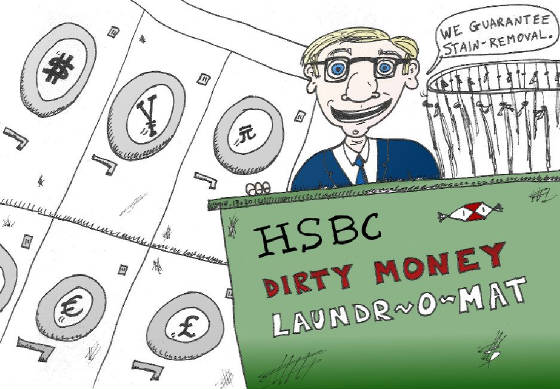
Long History of HSBC Money Laundering
James Hall

If there was any lingering doubt about the supremacy of the internationalist banker over the canons of law, the latest HSBC exemption from criminal charges proves that the real masters of the planet are the criminal banksters. If this settlement was an abnormality and not the rule, one might argue the expediency for pragmatism, while deployable, is necessary. Unfortunately, for the financial elites, the facts tell a very different story.
"In court papers filed in federal court in Brooklyn, the federal government said the case against HSBC is related to the laundering of proceeds from narcotics trafficking via the Black Market Peso Exchange, a method by which money launderers convert cash narcotics dollars into Colombian pesos by buying and re-selling wholesale consumer goods.
"The lack of an effective anti-money laundering program at HSBC Mexico and HSBC Bank USA, N.A. contributed to the conduct charged" in the money-laundering case against narcotics traffickers, Justice Department prosecutors said in court papers."
"A year-long investigation by a Senate committee uncovered that HSBC acted as a conduit for drug money, disguised the sources of funds to evade U.S. sanctions against Iran, and included among its clients businesses with alleged ties to terrorism. HSBC’s internal culture has been "pervasively polluted for a long time," said Carl Levin, a senator from Michigan, who helped lead the investigation."
"Sending executives to prison has far more deterrent value that bringing a company down, since many will argue that employees who had nothing to do with the criminal activity would also be harmed."
"You can do real time in jail in America for all kinds of ridiculous offenses," Taibbi says. "Here we have a bank that laundered $800 million of drug money, and they can’t find a way to put anybody in jail for that. That sends an incredible message, not just to the financial sector but to everybody. It’s an obvious, clear double standard, where one set of people gets to break the rules as much as they want and another set of people can’t break any rules at all without going to jail."
The risk of going to jail for managing the enormous sums from the illicit drug trade is small, when governments are beholding for their contrived power to the banking cabals, which control the apparatus of fiat money.
"It should come as no surprise that British banking giant HSBC was caught laundering money for drug cartels and terrorist groups. HSBC, as we shall show, is the kingpin bank of the global drug trade, a bank which, since its founding in 1865, has been devoted to financing drug crops and laundering the proceeds. HSBC is, in fact, one of the key controlling institutions of the global illicit drug cartel we call Dope, Inc.
If you think that is an outlandish claim, consider the fact that EIR, through its book Dope, Inc., and in its affilicated War on Drugs magazine, published in the early 1980s by the National Anti-Drug Coalition, have made this charge for over 30 years, and have never been sued or challenged by the bank."
Once a drug launderer it is an easy step to institutionalized money laundering.
"The agreements put an end to uncertainty over the banks’ ability to operate within America, a key link in their global networks; their share prices both rose on the day the fines were announced. And the penalties are, in effect, levied on shareholders; not one corporate employee faces charges (although HSBC, at least, has clawed back payments to those responsible). Indeed, at a news conference this week Lanny Breuer, head of the Justice Department’s criminal division, suggested that an outright prosecution of HSBC was considered and rejected because of how damaging the impact could be on the bank’s viability, and thus on jobs and the American economy. Has a handful of banks become not too big to fail, but too big to jail?"

The significance of rejecting criminal pursuance of HSBC, and the long list of other mega banks is Prima Facie validation that the global economy operates under the self-serving guidance and often the practical permission of the largest international banking organizations.
The pattern of selective prosecution by the Injustice Department is no revelation, when the war on drugs is so profitable for the diabolic alliances that run the drug trade. Banking and government by acquiesce is a historic construct that hide behinds the law, while dealing in bribes, payoffs and hidden offshore accounts. Drug trafficking continues to prosper because government needs the threat of an evil enemy, while the agencies charged with its eradication are often corrupt game players.
The HSBC’s of this world are dirty participants in the real drug triangle; namely, drug traffickers, crooked government elements and complicit moneychangers.
James Hall – December 19, 2012
Discuss or comment about this essay on the BATR Forum
VIEW VIDEOS
http://www.batr.org/negotium/121912.html
